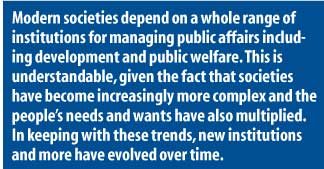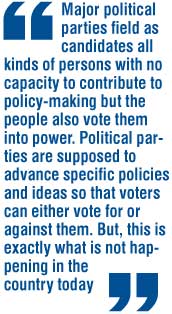Reply To:
Name - Reply Comment
 In fact modern societies exist and maintain stability and order, largely on the strength of their economic, political, social and cultural institutions. In spite of their complexity and diversity these institutions are characterised by certain underlying principles and values critical for their effective functioning. These principles and values can vary across different domains, i.e. economic, cultural, political and social. Yet, what creates some form of unity among these diverse institutions is the nature of the wider societal context. Yet, this unity may be undermined when institutions in one domain decay, adversely affecting the institutions in other domains. The need for institutional unity has increased in recent years as human societies have become more integrated and interdependent over time due to globalisation. Increasing global competition has compelled hitherto diverse societies to adopt largely uniform institutional patterns, particularly in the economic domain. For instance, countries that lag behind in technological advancement often tend to be left behind.
In fact modern societies exist and maintain stability and order, largely on the strength of their economic, political, social and cultural institutions. In spite of their complexity and diversity these institutions are characterised by certain underlying principles and values critical for their effective functioning. These principles and values can vary across different domains, i.e. economic, cultural, political and social. Yet, what creates some form of unity among these diverse institutions is the nature of the wider societal context. Yet, this unity may be undermined when institutions in one domain decay, adversely affecting the institutions in other domains. The need for institutional unity has increased in recent years as human societies have become more integrated and interdependent over time due to globalisation. Increasing global competition has compelled hitherto diverse societies to adopt largely uniform institutional patterns, particularly in the economic domain. For instance, countries that lag behind in technological advancement often tend to be left behind.
Sri Lanka’s traditional, pre-colonial society underwent a significant transformation under the direct influence of British colonial rule. New economic, social, political, administrative and cultural institutions were established. Though these institutions evolved gradually throughout the colonial period, they were all moving in a certain direction. For instance, the Ceylon Civil Service, which later became Sri Lanka Administrative Service, could be easily contrasted with the pre-colonial traditional feudal authority structure. Similarly, new urban capitalist firms could be easily contrasted with feudal production relations in the countryside. Political institutions were changing in the direction of representative government based on universal franchise. The steady expansion of modern educational institutions were creating greater opportunities for children to acquire new knowledge and skills and move into new professions, very different to traditional occupations of their parents.
 So, many people thought that the new institutions that evolved in Sri Lanka during and after the colonial rule were to set in motion a process of social transformation which was irreversible; society would continue to be guided by modern values and institutional principles. Not many people would have thought the institutions could decay and society would largely move away from such principles and values. Yet, our experience in the recent past has not been in keeping with such expectations.
So, many people thought that the new institutions that evolved in Sri Lanka during and after the colonial rule were to set in motion a process of social transformation which was irreversible; society would continue to be guided by modern values and institutional principles. Not many people would have thought the institutions could decay and society would largely move away from such principles and values. Yet, our experience in the recent past has not been in keeping with such expectations.
What we observe in many modern societies is a considerable degree of autonomy among different institutional domains i.e. economic, social, political and cultural. This is necessary to give expression to the diversity of ideas and interests in society, a pre-condition for healthy competition, contestation and dynamism. Democratic form of government, whether liberal or social democracies, enables citizens to articulate diverse ideas and interests through both the on-going, unrestrained public debate and the electoral process. On the other hand, authoritarian regimes often do not permit citizens to freely articulate diverse ideas and interests, inhibiting public discourse and social reforms.
Recent developments in Sri Lanka point to an unhealthy convergence of interests (and ideas) across economic, political, social and cultural domains, leading to the undermining of values and principles that are supposed to guide institutions in a particular domain. The result is institutional decay, making the institutions concerned dysfunctional. Though many examples could be cited, attention is focused on two institutions, namely, the Parliament and the University, for want of space.
Parliament
Parliament is undoubtedly the most important institution in a representative democracy. It is the supreme forum where diverse ideas and interests are articulated by people’s representatives, with a view to devising appropriate public policies and passing timely legislation on diverse matters. While it is understood that anybody other than those who are disqualified by law can be voted into Parliament, it is usually the legally constituted political parties that identify suitable candidates. Major political parties field as candidates all kinds of persons with no capacity to contribute to policy-making but the people also vote them into power. Political parties are supposed to advance specific policies and ideas so that voters can either vote for or against them. But, this is exactly what is not happening in the country today. Some of the members of Parliament who have been elected or nominated to Parliament show this in no uncertain terms. The decline of this institution has made it largely dysfunctional and counter-productive and many people have no trust in people’s representatives any more. Yet, the citizens do not seem to have any alternative, because major political parties do not give them much of a choice. Voting for a particular party does not make much sense as you do not know where the person you elect would end up after the election.
Universities
 Many countries across the world look up to their leading universities for guidance and expect them to come up with new ideas and innovations, besides contributing to human resource development. Graduates passing out from the universities become leaders in diverse sectors. Universities in turn expect the best and the brightest to join them and provide managerial and academic leadership. On the other hand, the changes in the university system in the country in the recent past clearly demonstrate that we are compelled to look down upon, rather than look up, to the universities. We certainly do not want the best and the brightest to give leadership to the country’s universities. We do not look up to the universities for guidance on important issues.
Many countries across the world look up to their leading universities for guidance and expect them to come up with new ideas and innovations, besides contributing to human resource development. Graduates passing out from the universities become leaders in diverse sectors. Universities in turn expect the best and the brightest to join them and provide managerial and academic leadership. On the other hand, the changes in the university system in the country in the recent past clearly demonstrate that we are compelled to look down upon, rather than look up, to the universities. We certainly do not want the best and the brightest to give leadership to the country’s universities. We do not look up to the universities for guidance on important issues.
Many factors, both internal and external, have contributed to the deterioration of the university system. It has become largely dysfunctional. It does no longer perform some of the key functions assigned to it as in more developed countries in the world. Universities are supposed to inspire the general public, in particular younger generations. Instead, they have become another source of frustration and disillusionment for many in this country.
.jpg) The situation is not any better with respect to institutions in almost all other fields. Many factors have contributed to this, including the deterioration of the quality of education, rise of individualism, the loss of morales due to politicisation and the breakdown of the normative order. The decayed and dysfunctional institutions do not facilitate sustainable development. They do not help to improve the quality of life of the people either. This is an area that deserves the urgent attention of policy makers and concerned citizens. The need for wide ranging institutional reforms can no longer be ignored. We could do so only at our own peril.
The situation is not any better with respect to institutions in almost all other fields. Many factors have contributed to this, including the deterioration of the quality of education, rise of individualism, the loss of morales due to politicisation and the breakdown of the normative order. The decayed and dysfunctional institutions do not facilitate sustainable development. They do not help to improve the quality of life of the people either. This is an area that deserves the urgent attention of policy makers and concerned citizens. The need for wide ranging institutional reforms can no longer be ignored. We could do so only at our own peril.